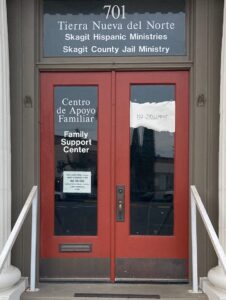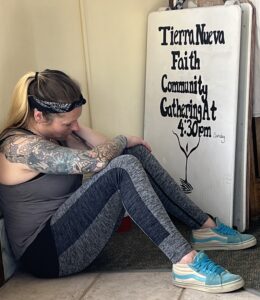 Many of the people involved in Tierra Nueva’s church and Bible studies are either still in active addiction or in some stage of their recovery process. In both cases people are accustomed to dealing with barriers to receiving benefits, keeping parental rights, employment or receiving or keeping their housing in a homeless shelter, subsidized housing or other services.
Many of the people involved in Tierra Nueva’s church and Bible studies are either still in active addiction or in some stage of their recovery process. In both cases people are accustomed to dealing with barriers to receiving benefits, keeping parental rights, employment or receiving or keeping their housing in a homeless shelter, subsidized housing or other services.
Regarding church people also assume there are barriers keeping them out, and even separated from God. Barriers that block people’s access to God and church must be deliberately identified and torn down!
Common barriers to social services include active addiction, criminal record, not having government-issue ID or legal immigration status, mental health issues, criminal history, active criminal warrants, and partners not in active recovery.
Many people who attend Tierra Nueva are all too familiar with high-barrier systems, such as in-patient residential and outpatient treatment programs, which some have been through numerous times. Some come who are enrolled in Skagit County’s alternative sentencing program called “Drug Court.”
Drug court holds participants accountable in a rigorous way that helps many. They require attendance at twelve-step meetings meetings hosted by CA (Cocaine Anonymous), NA (Narcotics Anonymous), or AA (Alcoholics Anonymous), and require random UA’s (urine analysis) to assure people are not using. Relapsing or failing to meet drug court requirements is punishable by jail time, court-mandated treatment or being kicked out of the program. Failing drug court means serving prison sentences for crimes for which they’ve pled guilty. Very few qualify for this high-barrier program.
Thankfully there are “low-barrier” shelters and other organizations that try to minimize requirements so more more people can access services. “Detox” is technically “low-barrier,” except that there are often no available beds!
Churches are often viewed as some of the highest-barrier places from which people assume they’d be excluded for a myriad of other reasons– tragically reducing its reach. We at Tierra Nueva are seeing the urgency of deliberately presenting as a “no-barrier” church; we seek to welcome vulnerable people in our community, those marked by rejection.
People usually assume they’re going to be judged and outright rejected if they open-up and reveal their true lives. Their natural inclination is to avoid church altogether. Their default is to self-protect, hiding their true selves, past histories and current life situation.
Single moms expect rejection for their “out-of-control” kids. Others would assume church people would exclude them for being an unmarried couple, smelling like weed, being a smoker or vaper, living in their car or on the street, using profanity, frequenting casinos, struggling with mental illness, ignorant of or unsure about Christian faith, not knowing the Bible, being overweight, having active warrants, certain tattoos, having children in foster care, having had abortions, gang affiliation, undocumented status…
These prejudices are regularly reaffirmed by the media, who remind people of the culture wars, highlighting many professed Christians positions against abortion, anti LGTBQ, tough on crime, pro-border wall, etc.
Sadly, people’s general perception of Christians as moralistic, legalistic, and hypocritical is continually reinforced. A friend of mine who has spent over 25 years in prison recently texted me his view of church:
“If you tasked me with finding a good person in a million but I could only hunt at churches or prison, I would choose prison. Because no one pretends to be good there. In fact, people exaggerate their badness in prison, and in church everyone presents as if they are on the path… I just find true convicts more honorable than rank and file Christians, and that certainly is true in their leadership.”
People coming in off the streets need positive eye contact from people who express authentic, non-judgmental presence. Barriers that block people from access to the church must be deliberately confronted through establishing a culture of welcome to people just as they are. This means welcoming people at the door or even outside, speaking that welcome out from the front, and creating an environment of no judgement that is consistent from start to finish.
This also means not identifying too overtly with typical recovery culture, and even overtly disassociated from its legalism (without condemning the need for higher barriers when needed to protect people in recovery). We announce Jesus as Savior of the world, friend of sinners, pursuer of the forsaken and lost, forgiver of our sins 70×7, canceller of our debts, who qualifies the disqualified.
We carefully think about the language used in worship songs, teaching, prayers, and liturgy so that it can be understandable to people who may have little formal education. Often people unfamiliar with church culture will not understand Christian lingo, including talk of lions, lambs, blood, the cross. Assume that most everything needs to be explained, always without condescension, with examples that people from the streets can identify with.
Messaging about God must continually express God’s unconditional, no-barrier love most visible in Jesus, which we must receive through the Holy Spirit over, and over again. And this same no-barrier love can then be embodied by the “body of Christ”—the church community itself.
This doesn’t mean we promote a boundary-less, anything-goes, free-for-all space! A safe, nurturing environment must be cultivated and continually guarded, with attention given to protecting people from anything predatory.
We carefully address legalism when it arises, and work to reign in hyper-spiritual language or manifestations that can scare or alienate people as they arise. We must creatively and continually re-state the liberating message that God qualifies us and saves us by grace, even as we attempt to embody the Gospel through our practices.
We end each Sunday with an “open-table” communion service before sitting down together for soup or a potluck. After gathering in a big circle, someone leads us all in a printed liturgy which includes this question and response.
Leader: Who is invited to this table?
People: “All are invited and welcomed to this table, regardless of who we are, where we have come from, or how we have been living our lives. God invites us here just as we are. God’s love for us is so strong that God became one of us so that when we put our trust in Jesus we are rescued from the rule of darkness, and enter into his abundant life, even now and forever.”
No-barrier mission is easiest when we take the church to the streets, homes, fields, homeless encampments, jails, prisons, and workplaces of our communities. Jesus himself embodied God’s movements towards people wherever they were: on the roads, beside the sea, in villages, homes, synagogues, public gathering places, in the company of the sinners of his time. Jesus compares himself to a shepherd who seeks after lost sheep until he finds them, placing them on his shoulders and celebrating their return with friends and neighbors.
As disciples of the Good Shepherd Jesus, we seek to do this through regular outreach on the streets, Bible studies in public parks, and visits to people in their homes. Being emissaries of a no-barrier God is a vocation that the Holy Spirit is continually renewing and inspiring, leading us outside across lines of difference, and welcoming people inside into communities of inclusion.
Spotify Podcast – https://open.spotify.com/show/0izQqZHnd28fBwOvmhasux?si=ebeb1404fa734aeb
Apple Podcast – https://open.spotify.com/episode/5bAaLwrqgwHJ1p6ErtA3WH?si=b63e92a6fe4646eb
